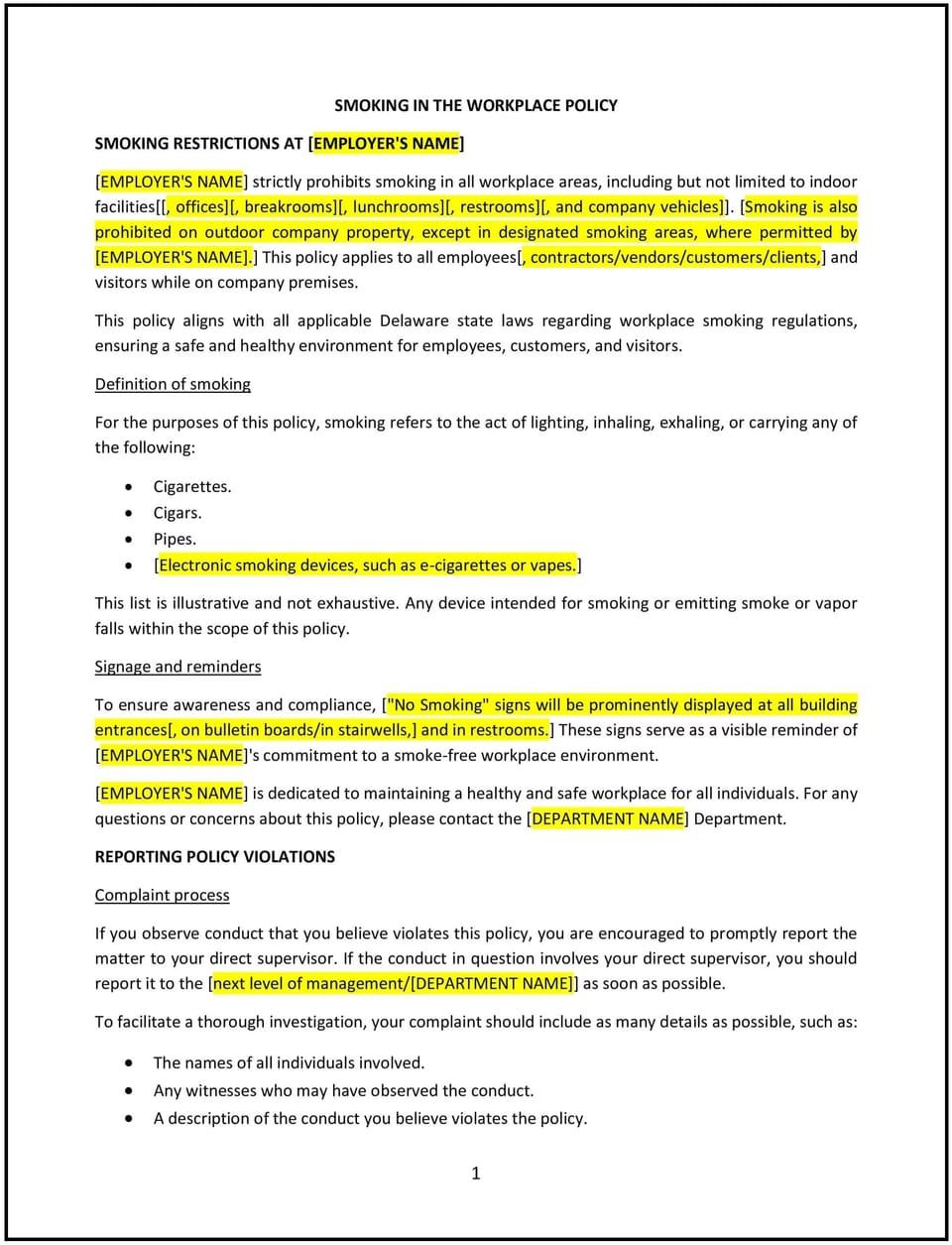Smoking in the workplace policy (Delaware): Free template

Smoking in the workplace policy (Delaware)
A smoking in the workplace policy helps Delaware businesses maintain a safe and healthy environment by establishing clear guidelines on where smoking is permitted or prohibited. This policy ensures compliance with Delaware’s Clean Indoor Air Act and protects employees from the risks associated with secondhand smoke.
By implementing this policy, businesses can promote health, reduce conflicts, and support a safe work environment.
How to use this smoking in the workplace policy (Delaware)
- Define prohibited areas: Specify where smoking is not allowed, such as inside buildings, company vehicles, or designated outdoor areas.
- Designate smoking areas: If applicable, identify specific outdoor locations where smoking is permitted, ensuring they comply with Delaware regulations.
- Address e-cigarettes and vaping: Include guidelines on the use of electronic cigarettes and vaping devices to align with Delaware’s laws.
- Communicate employee responsibilities: Outline expectations for employees to adhere to the policy and respect designated smoking areas.
- Provide support for quitting: Offer resources or programs, such as smoking cessation initiatives, to support employees who wish to stop smoking.
- Enforce the policy: Detail the consequences for policy violations, ranging from warnings to disciplinary action, based on the severity of the infraction.
Benefits of using this smoking in the workplace policy (Delaware)
This policy offers several benefits for Delaware businesses:
- Ensures compliance: Aligns with Delaware’s Clean Indoor Air Act and other relevant regulations, reducing the risk of legal penalties.
- Protects employee health: Minimizes exposure to secondhand smoke, creating a healthier work environment.
- Reduces conflicts: Establishes clear rules to prevent disputes about smoking in the workplace.
- Enhances workplace safety: Reduces fire hazards associated with smoking materials.
- Supports inclusivity: Balances the needs of smokers and non-smokers by providing clear guidelines and designated areas.
Tips for using this smoking in the workplace policy (Delaware)
- Communicate the policy clearly: Ensure all employees understand the rules regarding smoking and where it is permitted or prohibited.
- Use clear signage: Place visible signs in non-smoking and designated smoking areas to reinforce the policy.
- Train managers: Provide training on how to enforce the policy consistently and address violations appropriately.
- Offer smoking cessation resources: Encourage employees to quit smoking by providing access to support programs or health resources.
- Review regularly: Update the policy as needed to reflect changes in Delaware laws, workplace practices, or employee needs.
Q: Why is a smoking in the workplace policy important for my business?
A: This policy ensures compliance with Delaware laws, protects employee health, reduces conflicts, and promotes a safe and inclusive work environment.
Q: Are there designated smoking areas under this policy?
A: If the company allows smoking, designated outdoor smoking areas may be established in compliance with Delaware’s Clean Indoor Air Act.
Q: How does this policy address e-cigarettes and vaping?
A: The policy includes guidelines for e-cigarettes and vaping, treating them similarly to traditional smoking in restricted areas.
Q: What should businesses do if employees violate this policy?
A: Violations should be addressed according to the policy’s outlined procedures, which may include warnings, education, or disciplinary action.
Q: How often should this policy be reviewed?
A: This policy should be reviewed annually or whenever Delaware smoking laws or company practices change to ensure continued compliance and effectiveness.
This article contains general legal information and does not contain legal advice. Cobrief is not a law firm or a substitute for an attorney or law firm. The law is complex and changes often. For legal advice, please ask a lawyer.


